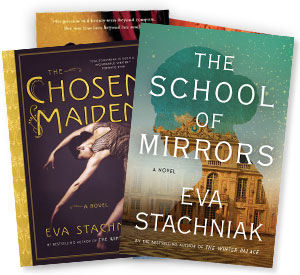As soon as I knew that I wanted to write a novel about Catherine the Great, I gave myself three months to do extensive research on the historical Catherine and the period in which she lived. I started with Catherine’s biographies, both recent and older ones, downloading 18th and 19th century books into my e-reader, taking advantage of the fact that old rare books are being extensively digitized and made available through major library portals. I read scholarly articles on various aspects of Catherine’s reign, her political conquests, her art collection, her gardening. I also read her own writing: memoirs and numerous letters which have preserved her voice from different stages of her life.
What general research produces is a great wealth of material which can yield many possible themes and approaches. I could try to tell the story of Catherine the Great’s whole life, or focus on one particular aspect of it. I could go sideways, focusing on Catherine’s many fascinating relationships. There is a whole novel in her complex relationship with Prince Potemkin. There is a novel in her troubled and ultimately tragic relationship with Count Poniatowski, the man whom she made the king of Poland only to take his kingdom away and make him her prisoner. There are friendships that have gone wrong: with Princess Dashkova who believed herself to be the most important participant in Catherine’s palace coup; with Countess Bruce who betrayed Catherine with one of the imperial favourites. And there are friendships that have been sorely tested: with Denis Diderot, or with Voltaire, whose philosophy Catherine found attractive in theory and impossible to use in practice .
My initial reaction to such a wealth of material used to verge on panic, but now, it has become one of detachment. In this initial stage, I acknowledge the shapes of the many novels this rich historical material could yield. I take notes on their possible trajectories. Sometimes – if a particular theme attracts me more than others – I write a few pages and watch where the narrative gets me. I try different points of view, different voices, making sure I don’t go too far into any of these projects, for I don’t wish to lock myself too early to any particular path. At this stage, I want to create options, not to plunge into them.
In the early going, I’m a great fan of Scrivener, a word-processing program which allows for the creation of many folders and subfolders for each character, idea, scene. With it, I find it easier to keep track of all my possible routes, see them at a glance, move them around, complete them, or break them apart. I also place all my research notes into a Scrivener project, and spend quite a bit of time creating short summaries of what I’ve learnt, coming up with key words and tags that will – in time – offer a possibility of patterns I might have overlooked otherwise.
By this time, the novel is slowly beginning to take shape. In my case it’s not a conscious process, but rather a patient reflection on all I have gathered in my head, in search of a clue, a hint that would provide a focus I need. I’m waiting for something, an image, a sentence, a piece of dialogue which will stand out from these amassed treasures, becoming so irresistible that I know the novel must grow from it.
In the case of The Winter Palace, that trigger was a sentence from Catherine’s letter to Sir Charles Hanbury Williams, British ambassador to Russia and her great supporter when she was still a mere Grand Duchess: “Three people who never leave her room, and who do not know about one another, inform me of what is going on, and will not fail to acquaint me when the crucial moment arrives.”
Catherine is referring here to Elizabeth Petrovna, the empress who brought her to Russia from Zerbst at fourteen. “The crucial moment” is to be Elizabeth’s much-anticipated death, which Catherine sees as her big chance to gain power. But who are the three spies who will not fail to inform her? And if one of them were to tell Catherine’s story what would she say?
This was when I began to hear the voice of a palace spy, and this is where The Winter Palace truly began.

Polish Language Site